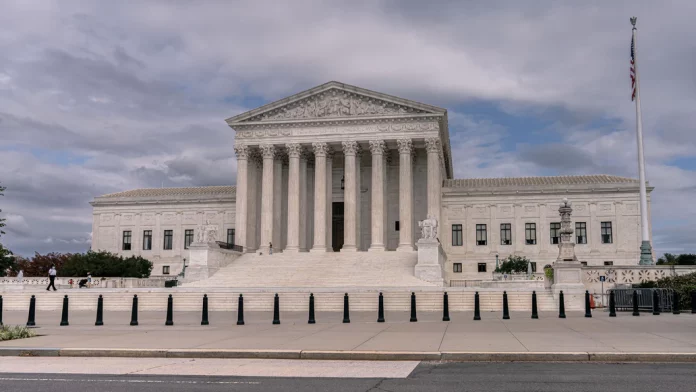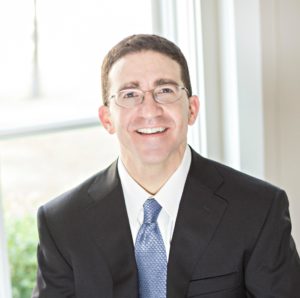
On March 31, an 8-1 majority of the U.S. Supreme Court ruled in favor of Denise Badgerow in an appeal over what sections of the Federal Arbitration Act federal courts have jurisdiction over. The decision impacts arbitration across the country, but it also has a Colorado connection with local attorney and Supreme Court veteran Dan Geyser representing Badgerow in the win.
Geyser, who moved to Colorado last year, is Haynes and Boone, LLP’s chair for its U.S. Supreme Court practice. He joined Badgerow v. Walters on appeal from the 5th Circuit Court of Appeals, writing the writ of certiorari to the U.S. Supreme Court. Geyser says about half of his practice consists of U.S. Supreme Court appeal work. Badgerow v. Walters was his 12th time going to oral argument in front of the high court and he’s set to argue number 13 on April 18.
While all cases he brings to the U.S. Supreme Court are interesting, Geyser said, several aspects of this case were especially interesting to work on. “One is that this is an issue that just affects a whole swath of common litigation,” said Geyser. “Arbitration is ubiquitous today, and motions to vacate or confirm arbitration awards arise all the time, and often arbitrations involve some sort of dispute over a federal client.” Parties often disagree over the outcome of arbitration he added, meaning the question of which court to file claims in arises often.

Badgerow v. Walters sets out guidelines to determine court jurisdiction when bringing arbitration disputes.
Badgerow initiated arbitration against her former employer, REJ Properties, Inc. in 2016 whose three principals were independent franchise advisors of Ameriprise Financial Services, Inc. In her view, she was terminated improperly and, as required by her employment contract, asked a panel of arbitrators to consider her claims. The arbitrators dismissed all claims against Ameriprise Financial Services and Badgerow then filed a petition in Louisiana state court to vacate the arbitration award. The franchise advisors moved the action to vacate to a federal court which Badgerow, requesting it be remanded back to the state court, argued lacked subject matter jurisdiction to consider the motion.
The federal court of the Eastern District of Louisiana decided it had federal subject matter jurisdiction to consider Badgerow’s motion to vacate and ruled against her, denying the motion to vacate and affirming the arbitration award.
On appeal to the 5th Circuit, Badgerow focused on the federal court’s finding that it had subject matter jurisdiction to consider her motion. The federal court applied the “look through” analysis set out by the U.S. Supreme Court in the 2009 case Vaden v. Discover Bank for Section 4 of the FAA on compelling arbitration. Section 4 doesn’t address the power to confirm or vacate awards, but the 5th Circuit held in 2020 that Vaden’s “look through” approach also applied to Sections 9 and 10 of the FAA and federal courts could apply this analysis to determine jurisdiction.
The Vaden “look through” approach is an unusual test for determining jurisdiction. While courts typically rely on the well-pleaded complaint rule, meaning the initial complaint invokes federal issues or questions, Vaden set out guidelines for a federal court to look at the underlying dispute behind an FAA Section 4 application to decide if the conflict would’ve fallen into its jurisdiction.
After the Vaden ruling, federal appeals courts across the country were split on whether the “look through” analysis applied to other sections of the FAA. The 3rd and 7th Circuits both declined to apply it to other sections of the FAA but the 5th, 1st, 2nd and 4th Circuits all extended Vaden’s “look through” analysis to other sections.
Overcoming a circuit split against his client’s position was a unique but exciting challenge, Geyser said. “You have a lot of different judges that are looking at the same statute and they’re seeing it completely differently,” he explained. “So to try to get the court to adopt the position that the minority [of circuits], so to speak, adopted instead of the majority, is always fun.”
Badgerow v. Walters asked the U.S. Supreme Court to clarify if federal courts should use the “look through” method to understand jurisdiction over other sections of the FAA.
The March 31 opinion authored by Justice Elena Kagan held that Vaden’s “look through” approach only applies to Section 4, citing a language used by Congress in Section 4 that is not found elsewhere in the FAA. Vaden’s decision, the majority held, depended on language in Section 4 that the “United States district court which, save for [the arbitration] agreement, would have jurisdiction” over “the controversy between the parties.” The phrase “save for” gave rise to the “look through” rule, the majority found, but without that phrase in other sections of the FAA, Congress didn’t authorize federal courts to look at the underlying disputes to determine jurisdiction.
The court’s opinion and the case, Geyser believes, showed the current court’s philosophy around interpreting statutes. “It tees up this perfect test for how you construe statute under today’s modern jurisprudence,” he said, adding that the close-read of the FAA spoke to how many of the justices rely heavily on textualism in their decisions. “It’s not a question of what Congress wished they wrote, but what did they actually write?” explained Geyser.
Only Justice Stephen Breyer disagreed with the majority, raising concerns that the decision didn’t consider “the statute’s purposes and the likely consequences of our interpretation” enough. “We risk adopting an interpretation that, even if consistent with text, creates unnecessary complexity and confusion,” Breyer wrote in his dissent.
Geyser disagreed with Breyer’s position that not applying Vaden to other parts of the FAA will create unnecessary confusion, adding that before Vaden came out in 2009, most parts of the FAA were already left to state courts. “We’re effectively restoring the system that worked perfectly well for decades,” said Geyser.
Arguing in front of the U.S. Supreme Court is always a humbling and exciting experience, Geyser said. “To be in front of the justices and to see them in action is just so exciting,” he said. “You feel very grateful and very lucky to be a small part of the process.”
As for Badgerow, Geyser said, “it’s a great issue and it’s really interesting, but you have to dive into the weeds to really see how it works.”

